- Home
- Allison Brennan
The Lost Girls
The Lost Girls Read online
Begin Reading
Table of Contents
About the Author
Copyright Page
Thank you for buying this
St. Martin’s Press ebook.
To receive special offers, bonus content,
and info on new releases and other great reads,
sign up for our newsletters.
Or visit us online at
us.macmillan.com/newslettersignup
For email updates on the author, click here.
The author and publisher have provided this e-book to you for your personal use only. You may not make this e-book publicly available in any way. Copyright infringement is against the law. If you believe the copy of this e-book you are reading infringes on the author’s copyright, please notify the publisher at: us.macmillanusa.com/piracy.
To Mike & Erin Pettingill, missionaries, who left successful careers to serve the less fortunate, first in Honduras, and now Equatorial Guinea.
ACKNOWLEDGMENTS
The Lost Girls was an emotional book to write, and required more research than I initially thought. I think Google maps has become my best friend!
First and foremost, I want to thank Mike Pettingill, a friend of mine who used to work with me in the California State Legislature. The year after I left the legislature to write full-time, Mike and his family became full-time missionaries with Missions to the World. Mike answered all my questions about what it’s like to be a missionary, the joys and the fears. I wish I could have used everything I learned. It takes a truly special person to give up everything they own to serve others.
Once again, Deborah Coonts—author, pilot, and all-around extraordinary woman—helped with the plane details. If I got anything wrong, it’s because I messed up.
I was thrilled when my cousin Jason Gifford married the amazing Dee—for more than because I like her. She’s also a nurse! Dee helped me tremendously with a pivotal scene in this book that, without her guidance, wouldn’t have been half as good. Thank you so much, Dee.
Crime Scene Writers led by the wonderful Wally Lind is always my go-to place for all types of crime questions—this time I needed information about warrants, foreign nationals, extradition, witness protection, and more. Thank you to all the cops, lawyers, medical examiners, pathologists, and P.I.’s who are extremely generous with their time and talent to help writers “get it right.” I may have taken a few literary liberties, but I try to stay as close to the truth as possible—while still keeping the story entertaining.
Always, thank you to my agent Dan Conaway who keeps me grounded, and my editor Kelley Ragland at Minotaur who helps each book reach its greatest potential. This time she outdid herself and forced me to dig deep into the emotional well to make The Lost Girls hit all the right notes.
Last but not least, my family—for understanding my crazy schedule, for being patient, for letting me bounce around ideas, and for making me laugh.
PROLOGUE
Father Sebastian Peña sat up in bed early that morning, mindful of every ache in his arthritis-ridden joints. Disease didn’t care if you were a saint or a sinner or—like most of God’s creatures—somewhere in between.
Sebastian had always been an early riser. The sunrise was his favorite hour, peaceful, unlike any other moment of the day. But it wasn’t quite five, early even for him. A rustling outside had him thinking a wind was picking up. But then he heard nothing. No wind, no cars. What had he heard in that dream state before waking; what had him rising before the sun?
As soon as his feet touched the cold floor he sought his slippers. He turned on the dim light, then wrapped a thin robe around his broad but frail shoulders. Sebastian had once been a large man. He’d played football in college, before he received his calling. He had been a wild young man, but like Saint Augustine, once he was called, he kept his vows. Still, he wondered at times—as inappropriate as it was—if God had afflicted his joints because of the prideful athlete he’d once been.
That sound again, faint but distinct, came from outside. He parted the blinds and peered out the window into the darkness. A small house behind Our Lady of Sorrows served as the parish rectory, which he shared with Father Peter Mannion. Father Peter was a young priest who had taken over the parish when Sebastian retired last year. Sebastian had both longed for and dreaded retirement. He was tired, very tired, but he loved his church. The families he’d seen week after week, from baptisms to weddings to funerals. The joys and the deep, deep sadness. Our Lady resided in a poor, rural community halfway between San Antonio and Laredo. Sebastian had been in the Laredo Diocese for years, but the last thirty he’d spent here, in this small parish, in this impoverished town. He was here only for a few more months, to help with the transition. By January he’d be settled into a retirement home in Tucson, Arizona—a great relief from the Texas humidity, which worsened his arthritis.
But he didn’t want to leave.
A clang of metal on metal made him pause. A chest-high wrought-iron gate circled the property—easy enough to climb over if someone felt compelled to vandalize or rob the church. Perhaps it was the garbage cans, a cat or opposum in the trash again. Father Peter was far too forgetful. How many times had Sebastian told him to secure the lids?
Sebastian walked through the house. The living and dining areas had been converted to the parish secretary’s office and his private office. No, not his anymore … Father Peter’s.
“Forgive me, Lord,” he muttered as he turned on the entry light. Yes, his pride and jealousy were coming through. He had thought he’d conquered those vices decades ago, but turning over his parish to another, younger priest had brought back emotions he thought he’d never feel again. Along with the sick sensation that his life was over.
For seventy-one, Sebastian was a healthy man. He drank in moderation, had never smoked, and exercised regularly—except on days like today when his arthritis would prevent him from doing much more than walking. His life wasn’t over. He could still celebrate Mass during the busy seasons, he could still participate in the church, he could volunteer. Play golf. He almost laughed at the thought. He’d never picked up a golf club in his life. Perhaps he could volunteer at a church high school as a coach. He would enjoy that, working with youths and teaching them. There were options. He wasn’t dead yet.
Sebastian unlocked the door and stepped onto the small porch. It was a chilly morning, the first sign that autumn was approaching. Later that day it would again be hot, but the morning was refreshing.
He looked around. His body may be failing, but his eyesight was not. The streetlights in front of the church didn’t reveal anything suspicious. No one was climbing over the section of the fence he could see. Father Peter was still sleeping: as he’d walked through the kitchen, he’d noticed that the coffee had yet to be made. The young priest would rise by six to prepare for the morning Mass. Sebastian had never acquired the taste for coffee, though he enjoyed tea.
He heard a faint cry—it sounded like a baby. This early in the morning? A parishioner, perhaps, needing solace?
He walked slowly down the porch stairs. Out of the corner of his eye, he saw a flash of light in the dark. He turned and looked down. It wasn’t a light; it was a white cloth, left under the statue of Saint Elizabeth.
Sebastian bent down to pick it up. At the same time he noticed there was something moving beneath the cloth, he heard a murmur.
The murmur turned into a weak cry.
Dear Lord, what is this?
Of course he knew.
A baby.
A newborn.
Sebastian ignored the pain and creaks in his joints as he knelt in the dirt and picked the baby and the blanket up from the cold earth. Holding the infant close to his chest with one large hand,
he used the statue as leverage to rise again, then walked back to the house. The child’s cries were muted. Sebastian barely gave the mother or circumstances a thought, not then. The poor soul in his arms was his immediate concern.
Headlights approached from the south end of the street. The high beams were on and the car drove slowly. Sebastian hurried back inside and closed the door. He bolted it, not quite certain why his heart was pounding. He didn’t turn on any lights, over and above what he’d already turned on before going outside. He didn’t want to draw attention to the small rectory behind the church.
The baby started crying again, its sound weak and sickly. Or was it? Sebastian knew little about babies. He’d blessed babies, he’d baptised babies and—on sad days—buried babies. Was the child hungry? What did one feed a newborn when there was no mother?
He took the baby across the hall to his room and turned on his nightstand light. He put the baby on the bed and opened the cloth. It was a shirt, not a blanket—and there was a lot of blood. He prayed without realizing the words were coming from his lips as he inspected the infant. The child didn’t appear to be bleeding, though the umbilical cord was still attached. It had been tied off, but looked unusually large and swollen. Was this common?
He took a clean undershirt from his drawer and wrapped the baby. She was a girl, a perfect, small human child. So delicate, so fragile … who would just leave her on the cold ground? Did the blood come from her mother? The umbilical cord was tied, which meant someone had cut the cord, tied it as a doctor or nurse would. But this baby had no wrist or ankle band; this baby hadn’t been born in a hospital. This baby had been born tonight, possibly only hours ago.
“Saint Elizabeth, please pray for this child laid at your feet tonight,” Sebastian said as he picked up the baby. He held her close. He had never had a child, but the protective instincts must have been granted to all God’s creatures, because Sebastian felt that he would do anything for this little soul. “Elizabeth,” he whispered and rocked the baby stiffly in his arms.
Sebastian looked down on the bed. Tangled in the bloody shirt that the child had been wrapped in was a necklace of some sort. He picked it up.
A simple, oblong silver locket hung from a long chain. On the front was a cross, on the back an intricate design. It looked familiar, but Sebastian couldn’t imagine where he’d seen it before.
He opened it. There were two pictures inside. On the right was a photo of two Hispanic girls who looked almost identical standing outside a small church that was unlike any he’d seen in the area; on the left one of the girls had her arm around a tall white girl wearing a wide-brimmed hat. They were in a field somewhere, but the details were lost in the miniature picture.
One of the photos was loose. As he tried to close the locket, it slipped in the catch, and then slipped when he opened it again. Something was written on the back. He searched for his reading glasses.
Ana, Siobhan, me.
Under the names was a phone number, but he couldn’t make out all the numbers. They were faded. Maybe someone with better eyes could read them.
He picked up the phone to call 911. Then he saw that the shirt had writing on it, in the blood.
He spread the shirt out.
Trust no one.
He put the phone down.
CHAPTER ONE
The house on El Gato Street appeared empty, save for a lone beat-up van in the weed-choked driveway and a pickup truck parked on the dead lawn behind the house. Photojournalist Siobhan Walsh had been watching the place for two hours, taking photos and zooming in to analyze every detail. She’d seen something inside. Movement behind the thick drapes.
Patience was her strength, and she would sit in the neighbor’s house as long as it took to get proof that her friends—two sisters who were practically family—were here.
Siobhan adjusted the zoom lens to focus on the van. Again. She’d already taken a series of pictures. The filthy Texas license plate was near impossible to read, but she used the technology built into her state-of-the-art camera to expose the numbers. She already had them memorized, but if she was right—and the van belonged to human traffickers—the number would lead nowhere.
She would follow up nonetheless.
Siobhan had good instincts, but there were times when she had to go against her gut in order to do the right thing. More often than not, she came out of such a situation not only unscathed, but with the result she wanted. Kane Rogan had once told her she was a cat on the last of nine lives. She scoffed. Some things were worth the risk. Of all people, Kane should understand.
Finding Marisol and Ana was definitely worth the risk.
It wasn’t as if she were going to confront the bullies who were holding the young women; she needed evidence. Pictures. She would expose the bastards for the world to see, while giving law enforcement information they needed in order to do their job. She’d been burned in the past when she turned over unverifiable information to local cops. It took them too long to mount an investigation—they wouldn’t act solely on her word that a crime had occurred. They wanted proof. By the time they had actionable evidence, the traffickers had moved out, taking the girls with them.
Or worse, the girls had been sold or killed.
Siobhan couldn’t take the chance that this particular enterprise would shut down overnight, not when it was the closest she’d come to finding the sisters. She’d take photographs of every person and car coming and going from the house, then she’d walk away. She’d have to, no matter how hard it would be to leave.
Unless she saw them with her own eyes. Then she would call 911 and say anything to bring in the police.
I’m not the idiot you think I am, Kane Rogan.
Siobhan stood and stretched. Two hours and her joints were creaking from sitting still for so long. She rolled her neck and lamented that she couldn’t break herself from the imaginary conversations she had with Kane. It had started years ago, almost from when she’d first met him, but the habit had grown worse since she’d left him in that hospital room three months ago.
I didn’t leave you, Kane; you kicked me out.
Jerk.
She had contacts other than Kane Rogan. He wouldn’t jump through hoops to help; he wouldn’t think this was his problem. He didn’t work cases in the United States; he much preferred the dark underbelly of Mexico where he didn’t have to play at being a diplomat, where life was cheap, where he could kill a cartel leader and walk away unscathed. Kane Rogan was perfectly willing to save a kidnapped American being held for ransom by a two-bit cop in the middle of Nowhere, Mexico, but he’d damn well make sure you knew how stupid you were while he saved your ass.
Siobhan sat back down and looked again through her camera lens. She was losing light. In an hour it would be dark, and she wouldn’t be able to see much of anything.
The small, broken-down houses were set far apart, most rented by migrant workers or longtime residents who couldn’t afford much. No air-conditioning in the hot summers; faulty heat in the cold winters. Dismantled cars cluttered dirt yards; metal and other large items that most would call junk—most of it was junk, Siobhan thought—littered the area. Refrigerators with and without doors, some chained and bolted. But the house across the street was cleaner than the others; it was not in as sorry a state of disrepair.
There was activity every day—when Father Sebastian first talked to Mrs. Hernandez, she’d said there were many people coming and going, men and women of all races, many of them pregnant. If Father hadn’t spoken at Mass about the baby left at the rectory, Mrs. Hernandez probably wouldn’t have even approached him. But Siobhan convinced him to release the information. Mrs. Hernandez was the only one who stepped forward. The only one who was willing to help, even though Siobhan saw fear and guilt in the eyes of others.
Father Sebastian had wanted to come with Siobhan tonight, but she wasn’t going to risk an old priest with arthritis so severe he could barely stand upright.
Right now, this was h
er only lead other than the baby herself. Father had called her Elizabeth, and the nurses in Laredo had kept the name. Siobhan couldn’t wait to return to the hospital and see her again. She’d promised Elizabeth that she would find her mother. There was no doubt in her mind that either Marisol or Ana had given birth to that small, beautiful child.
She stared out the window. Nothing had changed, except it had grown darker.
She needed something.
Please, God. Don’t let me leave with nothing.
Mrs. Hernandez came into the bedroom where Siobhan was sitting in the semi-dark, waiting for someone to exit the house across the street.
“Enrique will be home soon,” the woman said. “Please, you need to go.”
Mrs. Hernandez had been nervous from the moment Father Sebastian had convinced her to let Siobhan in, and those nerves had steadily increased. But she’d been the one who called Father when the van arrived two hours ago. She wanted to help, but she was scared.
Siobhan had faced people like Mrs. Hernandez many times.
“Ten more minutes, por favor.” What would ten minutes do that the last two hours could not?
“No more, no more,” Mrs. Hernandez said, a catch in her voice. She walked out.
Of course the woman was fearful—that’s what these bastards did. They scared people into silence. Good people, who recognized evil, didn’t want to face it down. They didn’t want to be hurt. Close the doors, shut the blinds; if they couldn’t see the bogeyman, the bogeyman couldn’t see them.
A false and dangerous sense of security.
She’d already searched property records. The property across the street was owned by a business in San Antonio that was most surely a front. That would be her next step—tracing the business. Even if she found Marisol and Ana …
When. Even when you find them …
… she would track down these people and expose them. Her camera had never let her down.

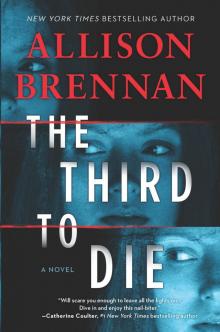 The Third to Die
The Third to Die Nothing to Hide
Nothing to Hide No Way Out
No Way Out Cold as Ice
Cold as Ice Cut and Run
Cut and Run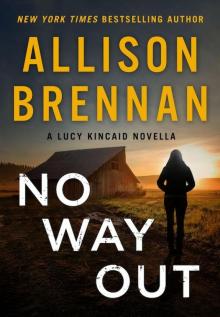 No Way Out (Lucy Kincaid Novels)
No Way Out (Lucy Kincaid Novels) Storm Warning
Storm Warning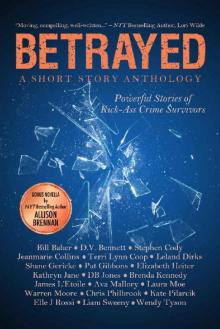 Betrayed: Powerful Stories of Kick-Ass Crime Survivors
Betrayed: Powerful Stories of Kick-Ass Crime Survivors Killing Fear pb-1
Killing Fear pb-1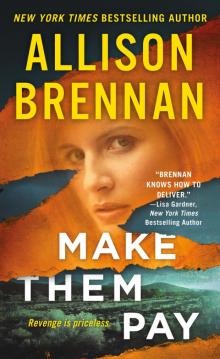 Make Them Pay
Make Them Pay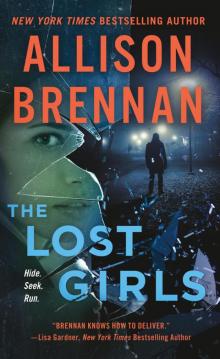 The Lost Girls
The Lost Girls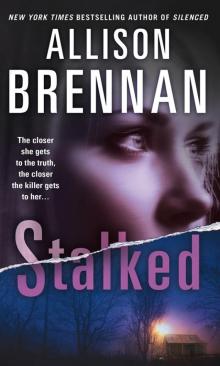 Stalked
Stalked Killing Justice
Killing Justice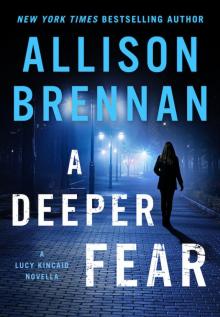 A Deeper Fear
A Deeper Fear Poisonous
Poisonous Fear No Evil
Fear No Evil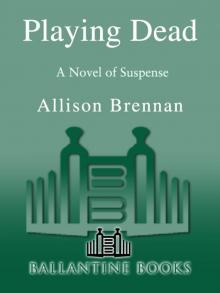 Playing Dead
Playing Dead Cold Snap
Cold Snap Vacation Interrupted
Vacation Interrupted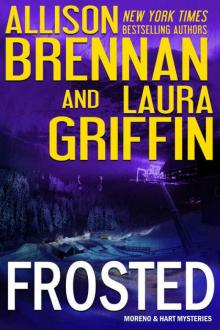 Frosted (Moreno & Hart Mysteries)
Frosted (Moreno & Hart Mysteries)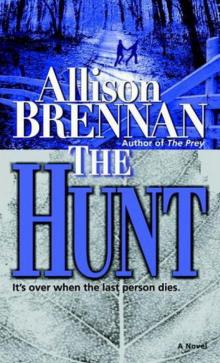 2 - The Hunt
2 - The Hunt Stolen
Stolen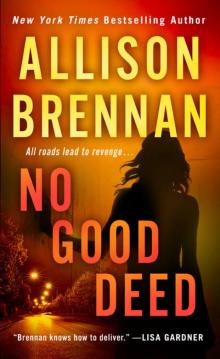 No Good Deed
No Good Deed Cutting Edge
Cutting Edge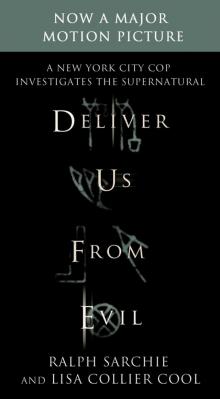 Deliver Us from Evil
Deliver Us from Evil If I Should Die
If I Should Die Speak No Evil
Speak No Evil Silenced lk-4
Silenced lk-4 Original Sin sds-1
Original Sin sds-1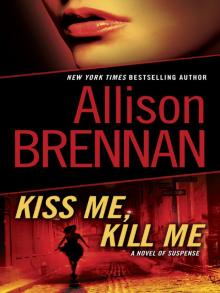 Kiss Me, Kill Me lk-2
Kiss Me, Kill Me lk-2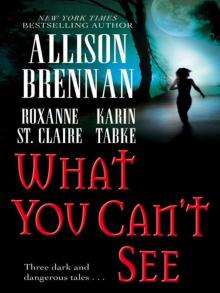 What You Can’t See
What You Can’t See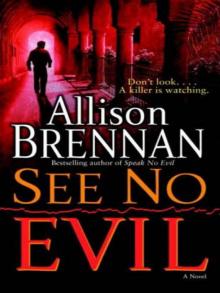 See No Evil
See No Evil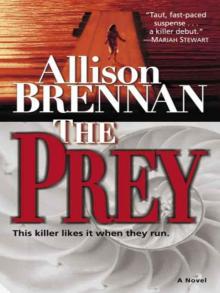 The Prey
The Prey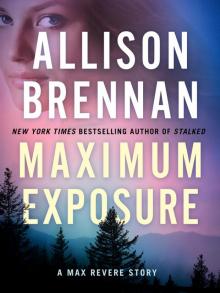 Maximum Exposure
Maximum Exposure Fatal Secrets f-2
Fatal Secrets f-2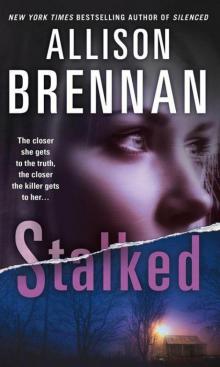 Stalked lk-5
Stalked lk-5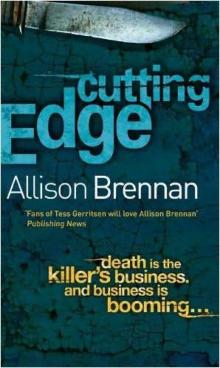 Cutting Edge f-3
Cutting Edge f-3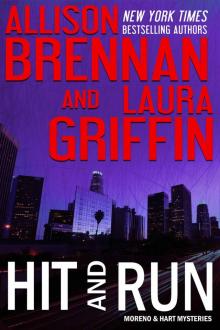 Hit and Run (Moreno & Hart Mysteries)
Hit and Run (Moreno & Hart Mysteries)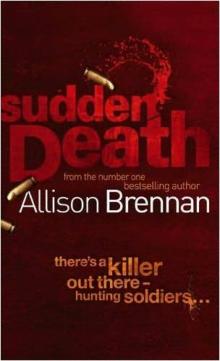 Sudden Death f-1
Sudden Death f-1 If I Should Die lk-3
If I Should Die lk-3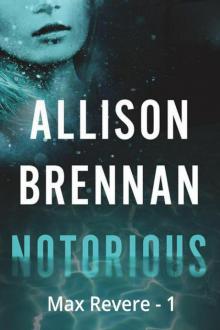 Notorious
Notorious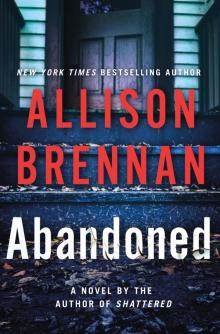 Abandoned
Abandoned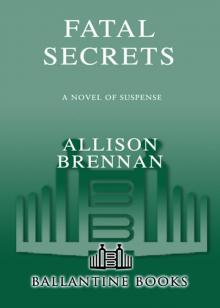 Fatal Secrets
Fatal Secrets The Hunt
The Hunt Carnal Sin sds-2
Carnal Sin sds-2 Love Is Murder
Love Is Murder Lost and Found
Lost and Found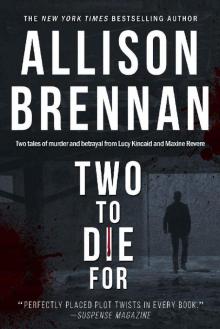 TWO TO DIE FOR
TWO TO DIE FOR Breaking Point
Breaking Point Best Laid Plans
Best Laid Plans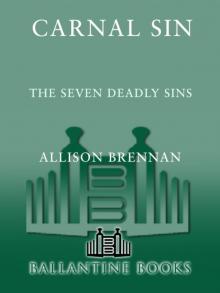 Carnal Sin
Carnal Sin Silenced
Silenced Dead Heat
Dead Heat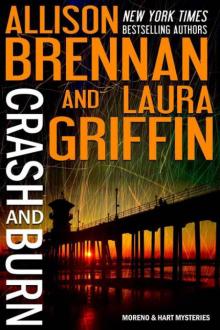 Crash and Burn
Crash and Burn Sudden Death
Sudden Death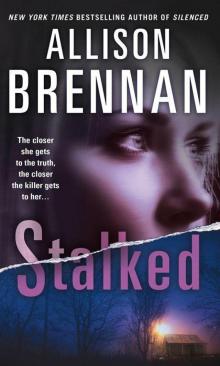 Lucy - 05 - Stalked
Lucy - 05 - Stalked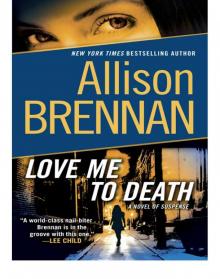 Mortal Sin
Mortal Sin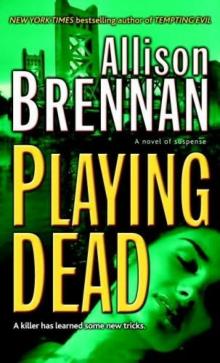 Playing Dead pb-3
Playing Dead pb-3 Kiss Me, Kill Me
Kiss Me, Kill Me Original Sin: The Seven Deadly Sins
Original Sin: The Seven Deadly Sins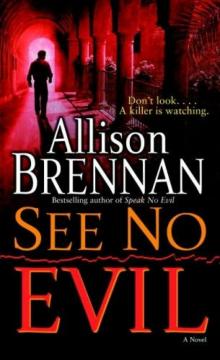 See No Evil e-2
See No Evil e-2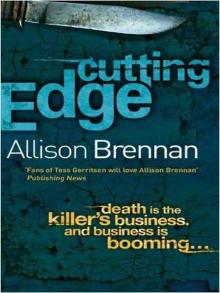 Cutting Edge: A Novel of Suspense
Cutting Edge: A Novel of Suspense Original Sin
Original Sin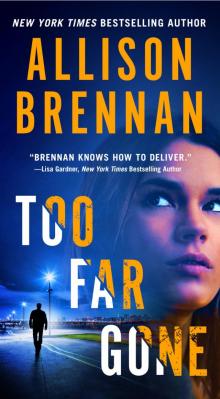 Too Far Gone
Too Far Gone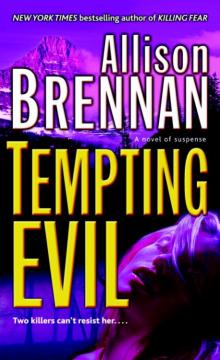 Tempting Evil
Tempting Evil Shattered
Shattered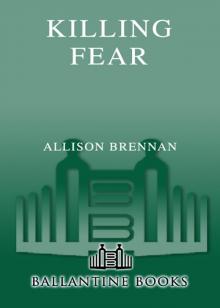 Killing Fear
Killing Fear Murder in the River City
Murder in the River City Love Is Murder (lucy kincaid)
Love Is Murder (lucy kincaid) Stolen (Lucy Kincaid Novels)
Stolen (Lucy Kincaid Novels)